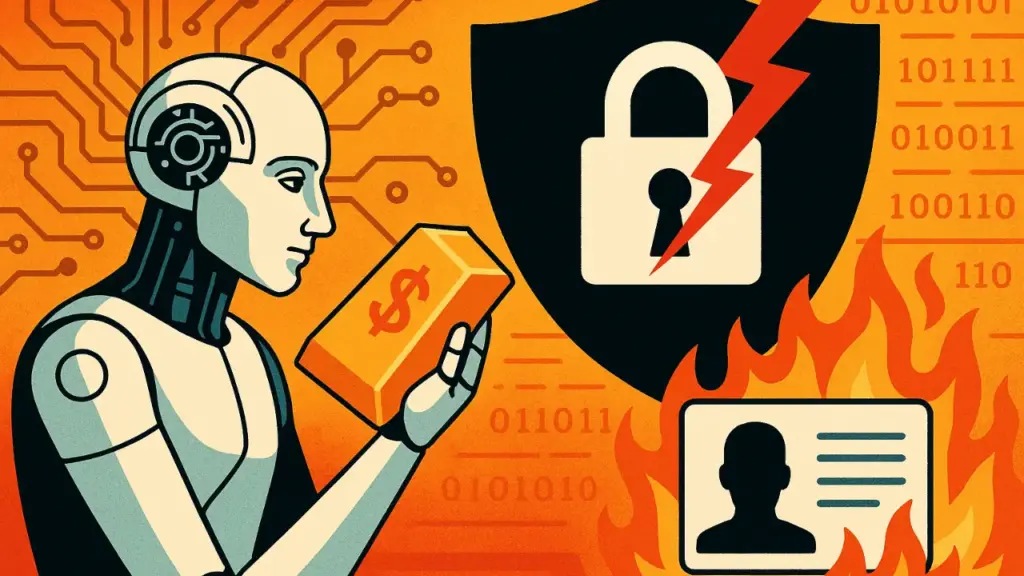Introduction: The Alarming Trade-Off
Artificial intelligence is the hottest trend in tech. Corporations are pouring billions into AI innovation, hoping to stay ahead. But in this rush, they’re making a critical mistake. They’re ignoring the very foundation of digital business — data security.
As someone who has spent decades in cybersecurity, I’m sounding the alarm. A new AWS study shows that 45% of IT leaders now prioritize generative AI investments over traditional security tools. This isn’t progress — it’s corporate negligence.
AI may be exciting, but data breaches are real. Today, we’ll explore how this AI-first mindset is leaving your personal data exposed. We’ll uncover the motivations behind these risky decisions and explain how they’re affecting real-world businesses and consumers.
The Corporate Shift That Should Terrify You
AWS surveyed over 3,700 IT decision-makers worldwide. Nearly half admitted they’re spending more on generative AI than on cybersecurity. Only 30% still prioritize security.
This is a shocking shift. Security used to be non-negotiable. Now, companies are chasing the next big thing while ignoring the very systems that protect them.
It’s like buying a Ferrari without checking the brakes. You might move fast, but you’re headed for disaster.
When I built CleanRouter, we made security our foundation. You can’t build anything lasting without it. But today’s leaders are letting hype override logic.
This is not just a one-time decision either. It represents a systemic shift in how budgets and priorities are structured. Boards and executives are under pressure to “innovate or die,” and AI feels like the silver bullet. But innovation without protection is like building a castle on quicksand.
The long-term implications of this shift are enormous. As companies ignore security best practices, they open the door for massive breaches that could affect millions of users.
Real Numbers, Real Risk
Check Point Research analyzed interactions with generative AI tools. The results should scare anyone who values privacy:
- 1 in every 80 prompts risks leaking sensitive data.
- 1 in 13 prompts contains potentially confidential information.
These aren’t small numbers. That’s 1.25% of all AI inputs posing a direct data threat. And nearly 8% of prompts are carelessly feeding sensitive content into public systems.
Imagine uploading your entire customer database to ChatGPT. Many companies are doing just that — without thinking twice.
And hackers? They know it. They’re already targeting these platforms, exploiting their weaknesses, and mining sensitive data.
The data being leaked isn’t always intentional. In many cases, employees use AI to draft emails, summarize documents, or generate code — but they include real-world examples or internal context. That context can include names, account numbers, and even login credentials.
These prompts are stored. Sometimes they’re used to train future models. Even if the data is anonymized, patterns can still be reverse-engineered. The risk is far greater than most executives understand.
This isn’t just about corporate data either. When companies leak information, customers suffer too. Personal addresses, phone numbers, medical histories, and banking details — all of it becomes vulnerable.
Feeding the Beast — How Sensitive Data Is Being Exposed
So what are companies putting into these AI tools? More than you think:
- Customer service transcripts
- Financial statements
- Internal emails
- Proprietary code
- Trade secrets
- Human resource documents
- Legal contracts
All of this is being fed into platforms that store, analyze, and sometimes even retain the data for model improvement.
Public AI systems are not private. Many of them process inputs in ways that violate both customer trust and privacy laws.
Worse, companies don’t fully understand how these AI tools handle data. They’re assuming safety without verification. That’s not just risky — it’s reckless.
Once data is leaked, you can’t take it back. AI tools may learn from it, duplicate it, or share it with other users.
Let’s say a legal team asks an AI to draft a new contract. If they copy-paste a previous agreement into the prompt window, they’ve just exposed confidential terms to a third-party system.
Companies are also using AI to assist with debugging code. But that often means pasting in full scripts — scripts that may contain access tokens, API keys, and back-end logic. Once exposed, attackers can use that information to compromise entire systems.
The Real Cost of Ignoring Security
Security breaches are expensive. According to IBM, the average cost of a data breach in 2023 was $4.45 million.
But the financial hit is just the beginning. When companies lose data, they lose customers. Trust is hard to build — and easy to destroy.
Reputation matters. A single data breach can tank a company’s stock, wipe out years of growth, and lead to lawsuits.
Executives know this. Yet the AI hype is clouding their judgment. They’re gambling with their company’s future for short-term gains.
CleanRouter succeeded because we put security first. It wasn’t flashy, but it worked. Today, more businesses need to embrace that mindset.
Let’s not forget the regulatory consequences. GDPR in Europe, CCPA in California, and similar laws elsewhere impose heavy penalties for mishandling data. Feeding customer information into an AI model without consent can trigger investigations and fines that easily reach seven or eight figures.
Rebuilding after a breach is harder than preventing one in the first place. It involves notifying customers, resetting infrastructure, hiring forensic teams, and facing media scrutiny. All of that is avoidable — if security is treated as essential, not optional.

The Coming Storm
This isn’t a future problem. It’s already happening.
Data is leaking. Hackers are exploiting AI. And organizations are unaware of how much they’ve exposed.
If current trends continue, we’ll see high-profile failures in the coming months. Big-name companies will make headlines — not for innovation, but for catastrophic data breaches.
The AI gold rush is blinding smart people. They’re building powerful tools on unstable foundations.
Security can’t be an afterthought. It must be the base layer of all digital innovation. Without it, AI will do more harm than good.
Industry analysts are already warning about this. From McKinsey to Gartner, reports now highlight the dangers of integrating AI too quickly. Insecure AI systems could lead to a rise in data fraud, identity theft, and business espionage.
For startups and small businesses, a single breach can mean the end. They don’t have the resources to recover. That’s why these companies must be even more cautious.
The storm is coming — and many organizations aren’t ready.
Conclusion: It’s Not Too Late — But It Will Be Soon
The message is simple: Security must come before AI.
Generative AI is powerful. But if used carelessly, it becomes a threat. Companies need to slow down, assess the risks, and protect their data before chasing the next innovation.
We’ve seen this before. Every gold rush ends with casualties. Don’t let your business become one.
At StartupHakk, we believe that real innovation comes from building on solid ground. AI is the future, but only if we secure the present.
If you’re a business leader, this is your moment to act. Audit your AI usage. Rethink your priorities. Talk to your security teams — and listen to them. Make sure that what you build today doesn’t become tomorrow’s headline disaster.




